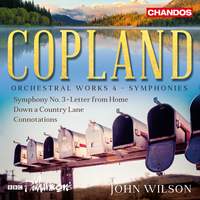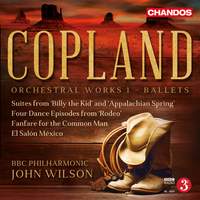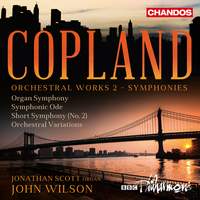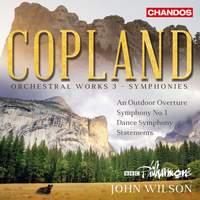Recording of the Week,
John Wilson conducts Copland's Third Symphony and Connotations
When the first, exhilarating instalment of John Wilson’s Copland series with the BBC Philharmonic appeared in early 2016, my colleagues and I wondered if the project had played its trump cards too early by kicking off with the composer’s most popular works (the ballet-suites from Appalachian Spring, Rodeo and Billy the Kid). We needn’t have worried – the project has gone from strength to strength, and this fourth volume bows out on an undeniable high.
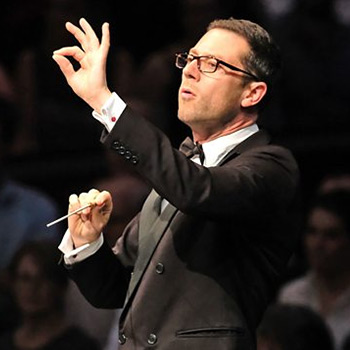 The album opens in confrontational style with Connotations, composed in 1962 for the opening of the Philharmonic Hall at Lincoln Center and dedicated to the New York Philharmonic and its then Music Director Leonard Bernstein, who did much to champion the piece (almost all recordings in the current catalogue are conducted by him). The reception at its premiere appears to have been civil but by no means warm: many of those present were wrong-footed by Copland’s departure from the immediately appealing musical language of works like Billy the Kid, and his experimentation with a modified version of twelve-tone music. Rather than softening its edges, Wilson shines a dazzling spotlight on them from the off: the opening series of brass chords are attacked head-on, but thanks to the distinctive narrow vibrato which he encourages from his trumpet-section there’s the underlying suggestion that the rather uncompromising introduction could pitch into what Antonio Pappano called ‘a real American frolic’ when he spoke to us recently about the Bernstein centenary.
The album opens in confrontational style with Connotations, composed in 1962 for the opening of the Philharmonic Hall at Lincoln Center and dedicated to the New York Philharmonic and its then Music Director Leonard Bernstein, who did much to champion the piece (almost all recordings in the current catalogue are conducted by him). The reception at its premiere appears to have been civil but by no means warm: many of those present were wrong-footed by Copland’s departure from the immediately appealing musical language of works like Billy the Kid, and his experimentation with a modified version of twelve-tone music. Rather than softening its edges, Wilson shines a dazzling spotlight on them from the off: the opening series of brass chords are attacked head-on, but thanks to the distinctive narrow vibrato which he encourages from his trumpet-section there’s the underlying suggestion that the rather uncompromising introduction could pitch into what Antonio Pappano called ‘a real American frolic’ when he spoke to us recently about the Bernstein centenary.
It turns out to be a delicious red herring: much of what follows is closer to the sound-world of Bernstein’s Age of Anxiety (particularly when the solo piano makes its appearance) than West Side Story, with some startlingly bleak writing for strings and celeste that wouldn’t sound out of place in a Shostakovich symphony. In the closing few minutes, though, there’s a backward glance to the idiom of Copland’s ballets which makes Bernstein’s decision to follow the piece with the popular Hoe-Down from Rodeo when he first programmed it seem like an astute artistic decision rather than a canny marketing trick.
 The main work on the album is the far less radical Third Symphony, written around the end of World War Two and commissioned by Serge Koussevitsky. The opening descending fourth from shimmering high strings and woodwind put me slightly in mind of the beginning of Mahler’s First Symphony, but broadens out into a lyrical string melody that’s shot through with an out-of-doors expansiveness that has an almost cinematic quality to it, something which Wilson subtly points up by coaxing shimmers of Hollywood-esque vibrato from his string-section without over-sugaring things; nor does he overplay the first glimpses of the famous ‘Fanfare for the Common Man’, which steal in almost unnoticed about five minutes in. The subsequent Scherzo is a boisterous, balletic delight, as light on its feet as Wilson’s accounts of the ballet suites and Dance Symphony earlier in the series - though as in Connotations and in the elegiac slow movement which follows, occasional whispers of Shostakovich make themselves heard.
The main work on the album is the far less radical Third Symphony, written around the end of World War Two and commissioned by Serge Koussevitsky. The opening descending fourth from shimmering high strings and woodwind put me slightly in mind of the beginning of Mahler’s First Symphony, but broadens out into a lyrical string melody that’s shot through with an out-of-doors expansiveness that has an almost cinematic quality to it, something which Wilson subtly points up by coaxing shimmers of Hollywood-esque vibrato from his string-section without over-sugaring things; nor does he overplay the first glimpses of the famous ‘Fanfare for the Common Man’, which steal in almost unnoticed about five minutes in. The subsequent Scherzo is a boisterous, balletic delight, as light on its feet as Wilson’s accounts of the ballet suites and Dance Symphony earlier in the series - though as in Connotations and in the elegiac slow movement which follows, occasional whispers of Shostakovich make themselves heard.
It’s in the final movement, though, that Wilson’s well-documented gift for making familiar Americana seem fresh-minted really comes into its own: thanks to his superb pacing and the pointed phrasing, the Fanfare (which appears first in the woodwind here, unlike the stand-alone version which Copland wrote three years earlier) comes across as an organic culmination of what’s gone before rather than a bombastic ‘American monument’, to borrow a phrase from Leonard Bernstein. I was half-expecting Wilson to play the triumphal blazing climax as a Shostakovich-style hollow victory, but in the event it comes off with open-hearted warmth that’s profoundly moving without ever suggesting bellicose optimism.
By way of a coda, we have the tenderly nostalgic Letter from Home in its 1962 revision for dance orchestra, and the lilting pastoral Down a Country Lane in an arrangement for school orchestra, which sounds a little as though George Butterworth had survived to write for Hollywood. It’s a beautifully understated postscript to the latest volume of a cycle that stands up favourably against Bernstein’s own Copland recordings, and surely ranks as one of the finest orchestral series of the past few years.
Copland: Orchestral Works Volume 4
Symphony No. 3, Letter from Home, Down a Country Lane & Connotations
BBC Philharmonic, John Wilson
Available Formats: SACD, MP3, FLAC, Hi-Res FLAC
BBC Philharmonic, John Wilson
Available Formats: SACD, MP3, FLAC, Hi-Res FLAC
Jonathan Scott (organ), BBC Philharmonic, John Wilson
Available Formats: SACD, MP3, FLAC, Hi-Res FLAC
BBC Philharmonic, John Wilson
Available Formats: SACD, MP3, FLAC, Hi-Res FLAC


